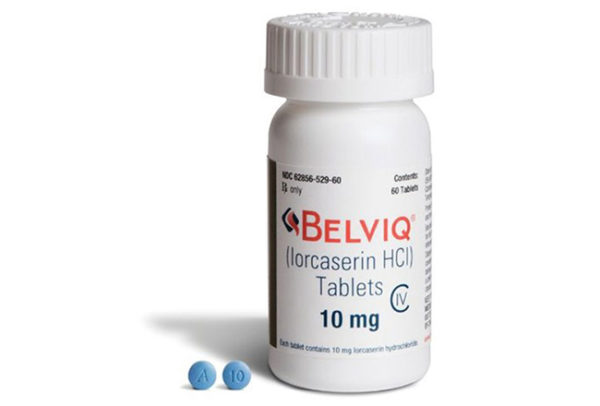A medicine with negative benefit to risk ratio has withdrawn from the US market.
(Belviq) lorcaserin is a weight loss medication developed by Arena Pharmaceuticals approved for treating obesity together with diet and exercise in adults with a body mass index (BMI) of 30 or greater (obese), or adults with a BMI of 27 or greater (overweight) associated with the conditions like high blood pressure, type 2 diabetes, or high cholesterol.

This diet drug reduces weight by promoting satiety (feeling of fullness). The mechanism is that lorcaserin acts as agonist on 5-HT2C receptors, present in the hypothalamic region of brain which are supposed to activate proopiomelanocortin (POMC) production. This proopiomelanocortin is involved in regulation of appetite. Higher levels of POMC results in satiety. Activation of this 5-HT2C receptors by lorcaserin helps a person to eat less quantity of food by having the feeling of fullness with the smaller amounts of food.

On 22-Dec-2009, USFDA received new drug application request for lorcaserin for weight management with the evidence of data on molecule safety and efficacy from 18 clinical trials comprising of 8,576 patients.
Denial of New Drug Application (NDA):
On 16 Sep-2010, FDA advisory panel raised concerns on this medicine.
Pertaining to efficacy- because of no significant percentage in the weight loss (5.8%) for patients treated with lorcaserin in comparison with placebo group (2.5%) after one year of treatment.
Pertaining to Safety- Concerns of heart valve problems, psychosis, identification of tumour findings in rats with high doses of lorcaserin. The application holder stated that these safety findings would not apply to human beings.
On 23-Oct-2010, owing to the above concerns FDA denied approval as benefits are “Not” outweighed by risks.
NDA Application resubmitted:
In response to FDA concerns, Arena provided additional data to the agency supporting the efficacy and safety of lorcaserin from a trial in 604 patients In May 2012, Arena resubmitted new drug application (NDA) for lorcaserin and this time won more votes from FDA panel with some restrictions (restricted use in patients with a body mass index (BMI) of over 30, or with a BMI over 27 and a underlying medical conditions such as high blood pressure or type 2 diabetes
On 27-Jun-2012, USFDA approved Belviq (lorcaserin hydrochloride), for chronic weight management in association with reduced-calorie diet and exercise. As the cardiovascular safety profile for lorcaserin was not yet established, Arena got this medicine approval with the obligation to conduct six post-marketing studies, including a long-term cardiovascular outcomes trial to assess the effect of lorcaserin on the risk for major adverse cardiac events such as heart attack and stroke. At the time of approval, the well documented adverse reactions for lorcaserin in non-diabetic patients are headache, dizziness, fatigue, nausea, dry mouth, and constipation, and in diabetic patients are low blood sugar, headache, back pain, cough, and fatigue.
After gaining approval, Arena started manufacturing this medicine in parallel with conducting post-marketing safety studies and lorcaserin became available in market since June 2013. It was also made available in south Korea market from 2015.
In 2016, lorcaserin got approved in Brazil and Mexico (with a different brand name VENESPRI®). Eisai Inc., (the U.S. pharmaceutical subsidiary of Eisai Co., Ltd) took the distribution rights for this medicine and acquired all global development and marketing rights. In 15-Jul 2016, USFDA approved extended release formulation for lorcaserin (BELVIQ XR).
Long Term Post Authorization Safety Studies:
On May 2018, the USFDA behest’s trail CAMELLIA-TIMI (A Study to Evaluate the Effect of Long-term Treatment With BELVIQ (Lorcaserin HCl) on the Incidence of Major Adverse Cardiovascular Events and Conversion to Type 2 Diabetes Mellitus in Obese and Overweight Subjects With Cardiovascular Disease or Multiple) completed which was started on Jan 2014 This is a randomized, double-blind, placebo-controlled clinical trial conducted at over 400 sites in 8 countries (U.S., Canada, Mexico, the Bahamas, Europe, South America, Australia, and New Zealand) to study ~ 12,000 men and women over five years with established cardiovascular disease or at high risk for cardiovascular disease.
Change in the Benefit-Risk Assessment!

On July 2019, the results of this clinical study were published. Company assessed the data and concluded that BELVIQ and its extended formulation are having a positive benefit-risk profile for the approved indication in approved population.
FDA reviewed the same published data of the long-term clinical trial and concluded that lorcaserin is a medicine with negative benefit risk profile. FDA stated that the potential risks of lorcaserin outweigh its benefits by specifically noting a numerical imbalance in the number of malignant patients. As per FDA’s analysis of trail results, lorcaserin had no additional risk of cardiovascular problems, however it had carcinogenic potential. FDA disclosed that 462 (7.7 %) patients were diagnosed with 520 primary cancers (pancreatic, colorectal and lung cancers) treated with lorcaserin compared to the placebo group, in which 423 (7.1 %) patients were diagnosed with 470 cancers. On Jan 2020, FDA announced to public about this potential risk of cancer associated with lorcaserin use
Call for Drug Withdrawal:

On 13-Feb-2020, In a Drug Safety Communication, FDA advised patients to stop taking BELVIQ and requested health care professional to stop prescribing and dispensing this medicine and to look for alternative weight-loss medications and weight management programs. FDA requested the manufacturer to withdraw this medication from the market.
As per the FDA’s decision, Eisai agreed to voluntarily withdraw all the lorcaserin products from the U.S. market and is working closely with the Agency on the withdrawal process.
Finally, A medicine with a proposed positive benefit risk ratio by company lost its place in market after affecting some patients with cancer. If both the non-clinical and clinical results of this medicine were considered serious, the tumorigenesis in some of the patient might get prevented.